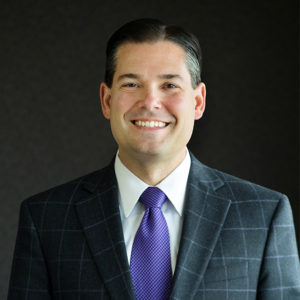Greim discusses free speech and political ads with KMBZ Radio hosts
 Graves Garrett partner Eddie Greim recently appeared on two broadcasts of KMBZ Radio’s Midday with Jayme & Wickett show to discuss the First Amendment and the media.
Graves Garrett partner Eddie Greim recently appeared on two broadcasts of KMBZ Radio’s Midday with Jayme & Wickett show to discuss the First Amendment and the media.
In the first broadcast, on Oct. 18, Greim discussed the law and common controversies surrounding political ads and social media. Campaigns are up and running at the presidential level, and the hosts of the show asked Greim to comment on how political ads function and how and when challenges to content can be brought.
This included a discussion about social media and the potential dangers of censorship on speech by private entities that can’t be held accountable for the actions. Facebook founder Mark Zuckerberg has been under intense scrutiny for his company’s policies on political speech.
“Social media publishers … have been regulators of free speech,” Greim said. “And what Zuckerberg has really done … is he’s said, you know what, we have become sort of a public forum. He didn’t use those words. That’s what he meant, and he’s saying we are not going to start policing speech here because one person’s speaking truth to power is another person’s libelous falsehood.”
Greim extolled the benefits of having more information available to voters than at any other point in American history, even if it is hard for voters to distinguish fact from fiction. Yet elections require the free exchange of ideas, he argued, because of the stakes: The power that government wields in America is stronger than at any point in the country’s history.
“This is all political speech. It enjoys the highest level of protection under the First Amendment,” Greim said. “And what I’d like to see is less regulation, less policing for content. We can have private defamation claims, but the standard is high for a public figure, and that’s probably the right regime. We should let the marketplace of ideas fight it out rather than leaving it to one or two people to decide what’s true and what’s not.”
In a later interview, on Nov. 6, Greim remarked on a recent Kansas Supreme Court ruling on whether criminal threat laws are unconstitutional under the First Amendment. The court struck down part of state legislation that criminalized violent language not backed up by an intent to act.
“This is an area we call true threats,” Greim said. “The statute allows [punishment for] a reckless threat instead of a true threat. The recklessness is the part that violates the Constitution, the First Amendment.
“What the law looks at is not how the person feels who receives the threat, the law looks at the state of the mind of the person who made the threat.”
The Kansas Supreme Court overturned a criminal conviction for an individual accused of making a threatening remark related to the death of a family dog. The man had talked about taking action against those he perceived to have failed to appropriately investigate prior incidents before the dog ended up found shot in a ditch.
Greim continued: “The question is what did the speaker intend to do. This is one of the areas that we call true threat doctrine, so you have to communicate a serious expression to commit an unlawful act of violence to a particular individual. The question is do you have to intend to communicate… the words that you say or do you have to intend to actually provoke a feeling of fear and actually threaten someone? Which is it?
“…[T]he Kansas Supreme Court said… ‘No, you’ve got to intend to threaten someone, not just say the words.’”
The full interviews can be found here.
Greim is a nationally recognized thought leader on political law and his practice at Graves Garrett focuses on free speech and election law, complex commercial litigation, internal investigations and whistleblower claims. His free speech and election law experience has included numerous constitutional challenges to election and campaign finance laws; representation of clients in state and federal ethics and campaign finance enforcement actions and investigations; initiative petition drafting and litigation; litigation and advice regarding First Amendment protections for petition circulation; representation of not-for-profit clients before state regulators; and advice on campaign and election law compliance.
